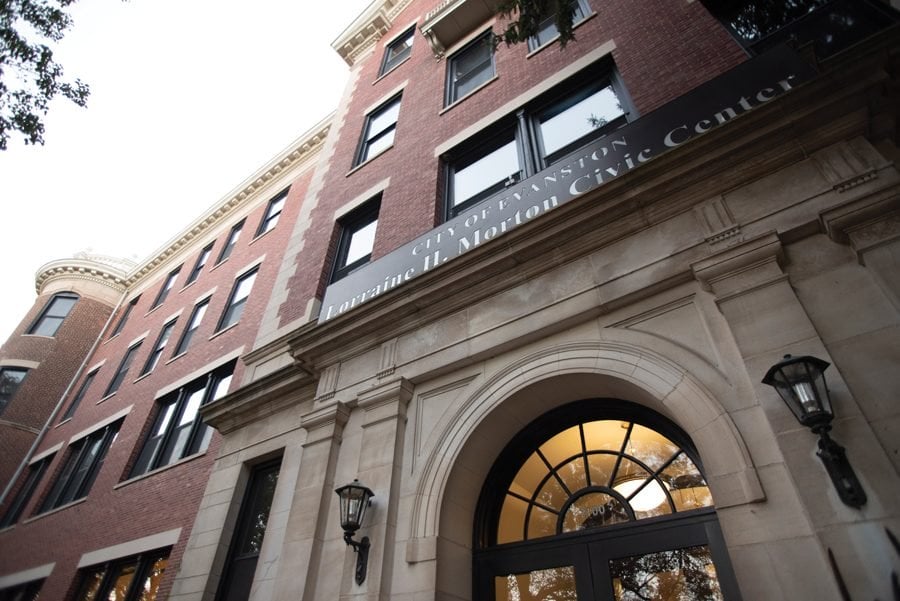As undocumented residents struggle without government aid, organizers call on City Council to help
Daily file photo by Colin Boyle
The Lorraine H. Morton Civic Center. City Council is slated to vote on the creation of a proposed aid fund for undocumented residents.
November 18, 2020
After months without government help amid a pandemic, there might be a light at the end of the tunnel for Evanston’s undocumented residents.
Undocumented residents are ineligible to receive federal aid in most situations including all pandemic aid, and the city has not yet designated any funds for them. As a result, some of Evanston’s most at-risk community members have survived nearly nine months without any form of assistance. However, some local organizers are pushing for the creation of an aid fund specifically to support the city’s undocumented residents. After months of work, their efforts are coming to fruition.
On Nov. 2, the city’s Human Services Committee unanimously recommended approval of the creation of the program, and City Council is slated to vote on it in an upcoming meeting. Supporters of the program say it’s essential that it receives approval in a timely manner, because time is of the essence for many undocumented residents.
Since the start of the pandemic, state-wide stay-at-home orders and health restrictions have served as methods to reduce the spread of the virus — including the city’s current stay-at-home advisory, which went into effect on Monday. However, essential workers are high-risk because of their exposure to the public, a factor which has contributed to high rates of COVID-19 positivity across the city’s Black and Latino communities.
“That’s a little bit disheartening, especially because a lot of our undocumented families here in Evanston are also essential workers,” community organizer Stephanie Mendoza said. “We’re in a community that is asking people who are already low-wage earners to stay home if they get sick, but there’s really no assistance for them when they do have to stay home.”
Stephanie Mendoza said many of these residents have difficulties accessing health care, especially because they are ineligible for programs like Medicare and Medicaid. For many of these families, the loss of one paycheck can strike a significant blow, she said, and without the health care they need, mandatory time off for illness can drag on or prompt costly medical bills.
The implications of a person’s citizenship status don’t stop with the aid they’re able to access for themselves, Stephane Mendoza also said. She said it is nearly impossible for a family with just one undocumented member to access any governmental aid.
Rebeca Mendoza, a community organizer with Evanston Latinos, said without government aid, many undocumented residents had to turn to smaller nonprofit organizations with limited funding. But the few organizations willing to support undocumented residents ran out of money early on, leaving residents to fend for themselves in potentially harmful ways, she said.
“We have had a challenge in gaining the trust from these community members,” Rebeca Mendoza said. “The dire situation that they were in left many of them resorting to predatory lenders, which will also only make it worse down the line.”
However, Rebeca Mendoza said when the city fund is established, she hopes it will serve as a lifeline for undocumented residents and prevent them from getting in similar situations.
The fund is slated to incorporate $25,000 in city funding, but Stephanie Mendoza said that amount alone won’t be enough to sustainably support the city’s undocumented community. As a result, Ike Ogbo, director of the city’s Health and Human Services Department, said during the Nov. 2 meeting that city officials are planning to explore other avenues of funding outside the city budget.
“This is a program that we of course want to sustain,” Ogbo said at the meeting. “We also have to think about the future, once we are past this pandemic, to sustain this program. One of the avenues that we’ll continue to explore will be donations.”
Stephanie Mendoza said the city’s undocumented residents have contributed to Evanston’s well-being for years, including through taxes and support for the local economy. However, programs catering to the undocumented community’s needs are few and far between.
As a result, she said it’s important that residents work with the city to ensure the program continues past the initial funding it receives from the city.
“It would only speak to the heart of Evanston being a welcoming city, for us to truly embrace this fund and take care of some of our most forgotten residents here in Evanston, who have long contributed to our community, and have never really asked for anything in return,” Stephanie Mendoza said. “I hope that our community finds it in their hearts, especially now that the winter months are coming, to donate to this fund.”
Email: [email protected]
Twitter: @jacobnfulton
Related Stories:
— Undocumented Evanston residents face financial, medical struggles without government aid
— Evanston Present and Future starts Reparations Ambassador program


